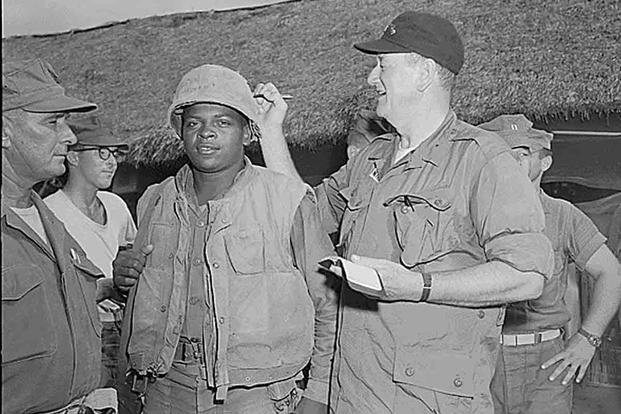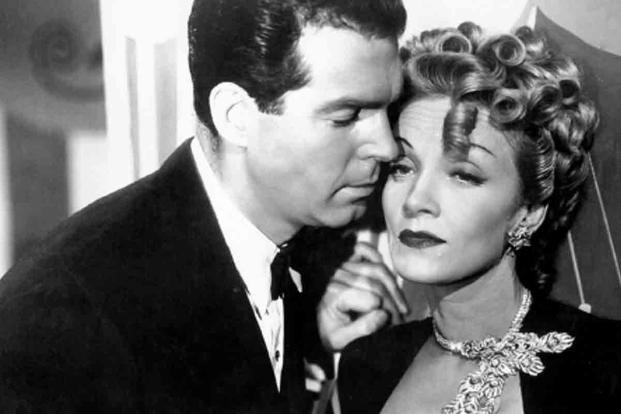When actor John Wayne visited American soldiers in Vietnam in the summer of 1966, he was warmly welcomed. As he spoke to groups and individuals, he was presented gifts and letters from American and South Vietnamese troops alike. This was not the case during his USO tours in 1942 and ’43.
According to author Garry Wills’ 1998 book, “John Wayne’s America: the Politics of Celebrity,” the actor received a chorus of boos when he walked onto the USO stages in Australia and the Pacific Islands. Those audiences were filled with combat veterans. Wayne, in his mid-30s, was not one of them.
Around the time the Japanese attacked Pearl Harbor in December 1941, Wayne was not the big-name actor we remember him being today. He was fresh off the box-office success of the 1939 film, “Stagecoach.”
Being drafted or enlisting was going to have a serious impact on his rising star. Depending on how long the war lasted, Wayne reportedly worried he might be too old to be a leading man when he came home.

Other actors, both well-established and rising in fame, rushed off to do their part. Clark Gable joined the Army Air Forces and, despite the studios’ efforts to get him into a motion picture unit, served as an aerial gunner over Europe. Jimmy Stewart was initially ineligible for the draft, given his low weight, but like some amazing version of Captain America, he drank beer until he qualified.
In his 2014 book, “American Titan: Searching for John Wayne,” author Marc Eliot alleges Wayne was having an affair with actress Marlene Dietrich. He says the possibility of losing this relationship was the real reason Wayne didn’t want to go to war.
But even Dietrich would do her part, smuggling Jewish people out of Europe, entertaining troops on the front lines (she crossed into Germany alongside Gen. George S. Patton) and maybe even being an operative for the Office of Strategic Services.

Wayne never enlisted and even filed for a 3-A draft deferment, which meant that if the sole provider for a family of four were drafted, it would cause his family undue hardship. The closest he ever came to World War II service was portraying the actions of others on the silver screen.
With his leading man competition fighting the war and out of the way, Wayne became Hollywood’s top leading man. During the war, Wayne starred in a number of western films as well as World War II movies, including 1942’s “Flying Tigers” and 1944’s “The Fighting Seabees.” According to Eliot, Wayne told friends the best thing he could do for the war was make movies to support the troops. Eventually, the government agreed.
At one point during the war, the need for more men in uniform caused the U.S. military brass to change Wayne’s draft status to 1-A, fit for duty. But Hollywood studios intervened on his behalf, arguing that the actor’s star power was a boon for wartime propaganda and the morale of the troops. He was given a special 2-A status, which back then meant he was deferred in “support of national interest.”
The decision not to serve or to avoid it entirely (depending on how you look at the actor) haunted Wayne for the rest of his life. His third wife, Pilar Wayne, says he became a “super-patriot for the rest of his life trying to atone for staying at home.”
After the war, he made a number of films set in World War II, including some of his most famous, like “The Longest Day,” “They Were Expendable” and “Sands of Iwo Jima.”
Despite his post-war patriotism, many labeled Wayne a draft dodger for the rest of his life. He succumbed to stomach cancer in 1979. His enduring influence on American media and the perception of American fighting men led President Jimmy Carter to award Wayne the Presidential Medal of Freedom posthumously in 1980.
-- Blake Stilwell, who was always more of a Robert Mitchum fan, can be reached at blake.stilwell@military.com. He can also be found on Twitter @blakestilwell or on Facebook.
Keep Up With the Best in Military Entertainment
Whether you're looking for news and entertainment, thinking of joining the military or keeping up with military life and benefits, Military.com has you covered. Subscribe to the Military.com newsletter to have military news, updates and resources delivered straight to your inbox.

















